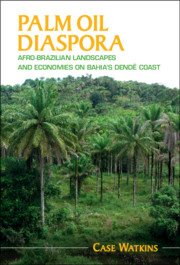‘A luminous narrative of the African oil palm in Brazil, where enslaved Africans applied their ancestral knowledges of dendê to create not only Bahia’s distinctive cuisine, but agroecologies of resistance. An indispensable history for anyone interested in the movement of plants, peoples, and African knowledge systems in the Atlantic World.’
Judith Carney - University of California, Los Angeles
‘Case Watkins magisterially narrates the entanglements of geography, history, and socio-environments among Afro-Brazilians whose extraordinary palm oil continues its illuminating journey not only as a local and global commodity but also in and across their diverse cultures, foodways, and sustainable agroforest landscapes.’
Karl Zimmerer - author of Agrobiodiversity: Integrating Knowledge for a Sustainable Future
‘The most comprehensive account of palm oil’s ecology, economy, and culture in Brazil so far. Watkins' superb history and ethnography of this potent icon of Afro-Brazilian Diaspora is a perceptive analysis of the complexities underlying the relationships between Black communities, environments and power.’
Luis Nicolau Parés - Universidade Federal da Bahia
‘Case Watkins interprets Brazilian landscapes to unearth very human stories of Afro Diasporic ingenuity and resilience. A methodologically innovative combination of archival records, geospatial mapping, and ethnography animates this sweeping portrait of enslaved and free people of African descent as influential but unrecognized environmental agents in the Americas.’
Mary Hicks - University of Chicago
‘Watkins’ book provides a master lesson in interdisciplinary history, constructing a detailed analysis of long-term geographical, political, social, and ecological relationships across the Afro-Brazilian diaspora.’
Marianne Schmink
Source: The Journal of Interdisciplinary History
‘… this is a tasty, multifaceted, and original analysis of dendê oil from a historic, geographic, and Afro-diasporic perspective that is sure to become a work of reference in the near future.’
Oscar de la Torre
Source: H-Net: Humanities and Social Science Reviews Online
'An engaging longue durée study of the introduction and development of Bahia’s palm oil agricultural sector and its relationship to the African diaspora, Palm Oil Diaspora is also the work of a scholar intimately familiar with the Brazilian landscapes that he studies … This study explores an important economic and cultural sector that has not yet received the attention from historians that it deserves; Watkins shows once again that sugar was not the only agricultural sector essential to Bahia’s economy, culture, and society. As much to the point, he has provided us with incontrovertible evidence of the environmental, agricultural, and cultural influence of Africa and Africans on the Americas.’
Mary Ann Mahony
Source: Hispanic American Historical Review
‘This is an extraordinary and timely study of both the history and contemporary circumstances concerning the African oil palm in Brazil … The book is clearly written, very well structured …'
Merle L. Bowen
Source: Agricultural History





